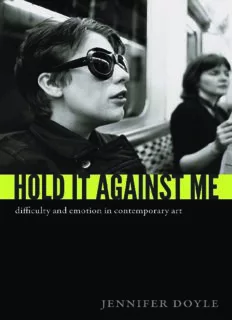
Hold It Against Me: Difficulty and Emotion in Contemporary Art PDF
Preview Hold It Against Me: Difficulty and Emotion in Contemporary Art
Hold It AgAInst Me jennifer doyle Hold It AgAInst Me difficulty and emotion in contemporary art Duke University Press Durham and London 2013 © 2013 Duke University Press Library of Congress Cataloging- All rights reserved in-Publication Data Doyle, Jennifer. Printed in the United States of Hold it against me : difficulty and emotion America on acid- free paper ∞ in contemporary art / Jennifer Doyle. Designed by Amy Ruth Buchanan p. cm. Typeset in Garamond Premier Pro Includes bibliographical references by Copperline Book Services, Inc. and index. isbn 978-0-8223-5302-7 (cloth : alk. paper) Frontispiece: Linda Mary Montano, isbn 978-0-8223-5313-3 (pbk. : alk. paper) Mitchell’s Death, 1978. Video (black and 1. Emotions in art. 2. Art, Modern— white, sound). Edited by David Wagner. 21st century—Psychological aspects. From the archive and courtesy of Linda 3. Art, Modern—21st century—Themes, Mary Montano. motives. 4. Art criticism. I. Title. nx650.e46d698 2013 publication of this 709.05’1—dc23 2012044742 book has been aided by a grant from the millard meiss publication fund of the college art association. For ron. Contents Preface ix Acknowledgments xxi 1 Introducing Difficulty 1 Hard Feelings 5 Patrolling the Border between Art and Politics 9 Vocabulary Shift: From Controversy to Difficulty 15 Difficulty’s Audience 21 2 Three Case Studies in Difficulty and the Problem of Affect 28 A Blank: Aliza Shvarts, Untitled (2008) 28 Theater of Cruelty: Thomas Eakins, The Gross Clinic (1875) 39 Touchy Subject: Ron Athey, Incorruptible Flesh: Dissociative Sparkle (2006) 49 3 Thinking Feeling: Criticism and Emotion 69 What Happened to Feeling? 69 The Difficulty of Sentimentality: Franko B’s I Miss You! (2003) 73 The Strange Theatricality of Tears: Nao Bustamante’s Neapolitan (2009) 83 Relational Aesthetics and Affective Labor 89 4 F eeling Overdetermined: Identity, Emotion, and History 94 The Difficulty of Identity 94 James Luna’s The History of the Luiseño People (Christmas, La Jolla Reservation 1990) (1990 – 1996, 2009) 98 Difficulty and Ideologies of Emotion 106 Carrie Mae Weems’s From Here I Saw What Happened and I Cried (1995 – 1996) 112 Conclusion: “History Keeps Me Awake” 126 David Wojnarowicz’s Untitled (Hujar Dead) (1988 – 1989) 126 Notes 147 Bibliography 183 Index 193 PreFACe At the opening of Mitchell’s Death (1978), Linda Montano’s face appears on the screen as a ghostly blur just barely moving to the sound of her voice. That voice intones a monk- like chant. Montano is reciting the story of the death of her ex- husband from a gunshot wound. When her face comes into focus, we see that it is covered with acupuncture needles (fig. 1). Over the course of twenty- two minutes, Montano shares in a meditative drone the experience of absorbing the fact of Mitchell’s death.1 She takes us through the flow of events: the first phone call, then others, the turning of her mind to their relationship, the decision to fly to Kansas and attend the funeral. The per- formance is carved from the rhythm of the artist’s breath as she pushes the story out and pauses for air. The story is sung with the same rhythm, in the same tone. She rehearses the cycles of thought and speech, the routines of grief. Finally, she describes being overcome by the need to see Mitchell’s body, and touch it, to hold him. She sees him at the crematorium, touches his head, hands, and feet. As the story arcs from shock and grief to this scene, the image dissolves back into its ghostly blur. Visually Mitchell’s Death is restrained; we see only the artist’s face, and it is immobilized. Montano’s voice goes on and on; one’s attention drifts and flows back. The story is a mantra; it feels as if it has been repeated so often
Description: